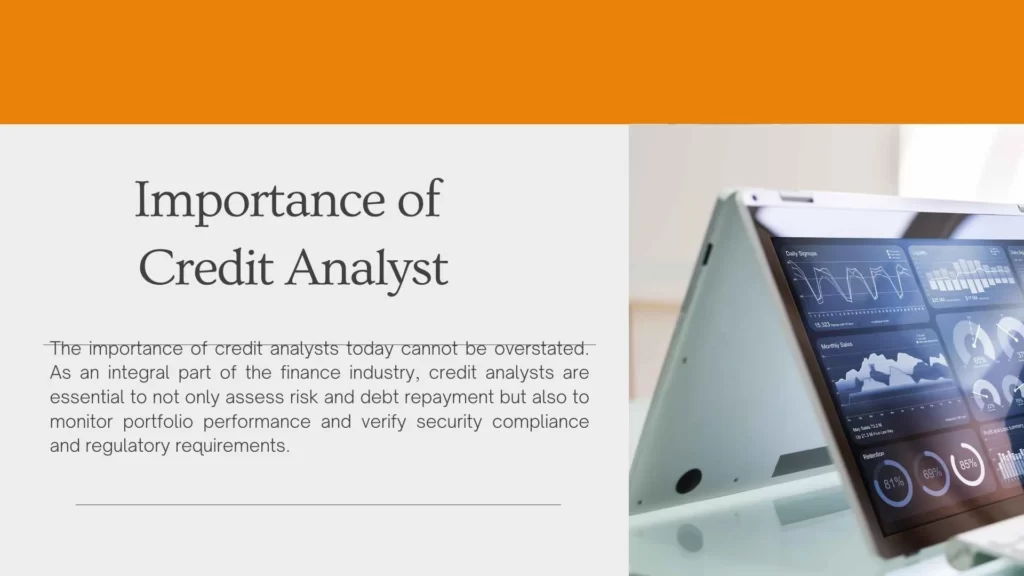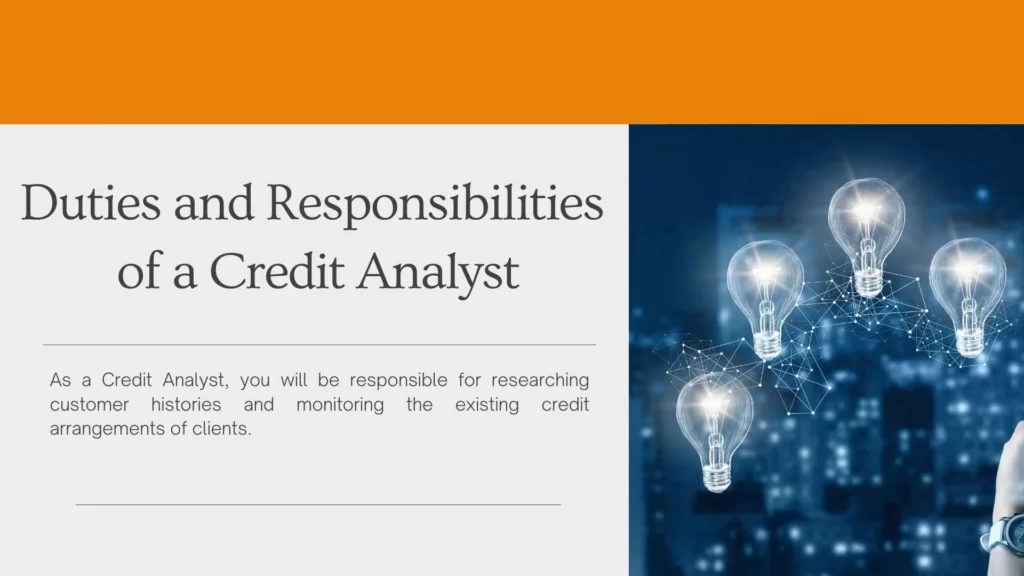Introduction
Have you ever wondered who credit analyst is, and what they do? A credit analyst is a professional who analyzes financial data to evaluate the creditworthiness of potential and existing borrowers. They are responsible for assessing the creditworthiness of an individual or organization by analyzing their financial statements, tax returns, debt repayment history, and other factors.
The primary role of a credit analyst is to assess the borrower’s ability to repay a loan based on their current financial situation. They analyze various financial documents such as income statements, balance sheets, and credit reports to determine whether a borrower can afford the loan they have requested. The goal of the analysis is to determine how likely it is that the loan will be repaid in a timely manner without defaulting.
It also provides recommendations regarding financing options for clients. They may advise clients on loan terms such as interest rates or loan repayment periods so that the client can make an informed decision about their financing options. They may also suggest alternative sources of financing for customers who are not approved for traditional loans.
It plays an important role in helping borrowers secure low-cost financing that suits their individual needs and abilities.
Importance of Credit Analyst

The importance of credit analysts today cannot be overstated. As an integral part of the finance industry, They are essential to not only assess risk and debt repayment but also to monitor portfolio performance and verify security compliance and regulatory requirements.
In addition to these duties, credit analysts play a vital role in fraud prevention and the identification of lending opportunities. By providing advice on management decisions and loan approval criteria, they ensure that clients make well-informed financial decisions. Credit analysts also manage the financial documentation review process, ensuring accuracy and efficiency in their workflows.
Most importantly, They must always balance accurate assessments with client relationships. Building strong relationships with clients is key to success today; it helps ensure that clients trust the analyst’s judgment and continue to do business with them in the future. In addition, it provides an opportunity for the analyst to make sure that clients are taking all necessary precautions when it comes to managing their finances properly.
Overall, They serve as a crucial link between lenders, borrowers, and investors; without them, much of the finance industry would collapse. Without their expertise in risk assessment and analysis, companies would have no way of assessing their borrowers’ reliability or likelihood of defaulting on loans — something that could ultimately lead to a financial crisis on a larger scale.
Have a look at the best PG Program In Investment Banking with a PLACEMENT GUARANTEE
Duties and Responsibilities of a Credit Analyst

As a Credit Analyst, you will be responsible for researching customer histories and monitoring the existing credit arrangements of clients. This is an essential role in any finance-related business, as it helps to determine creditworthiness and risk, both of which are integral parts of the lending process.
Your first duty is to research a customer’s financial background. This involves gathering information from a variety of sources – such as banks, insurance companies and credit bureaus – and then analyzing all this data to come up with an assessment of the customer’s repayment history. You will then need to use this information to make recommendations about granting credit limits or making other changes that could affect a customer’s account with your company.
You will also be in charge of monitoring clients’ existing credit arrangements. This includes keeping up to date on changes in their financial situation, evaluating current repayment trends and ensuring that customers meet their financial obligations. You may also be asked to offer advice regarding debt management and loan restructuring if needed in order for customers to better manage their accounts.
Finally, once you have completed your research and analysis, you will be responsible for recommending credit limits based on what you find. This can include setting specific levels for individual clients or developing general guidelines for more established customers. It will be your job to take into account the customer’s history and current financial situation when making these decisions, requiring a great deal of attention to detail as well as strong decision-making skills.
The duties and responsibilities of a Credit Analyst are varied but incredibly important in maintaining good relationships between lenders and borrowers. An understanding of financial principles is key here since it allows one to assess a customer’s risk profile.
How to become a Credit Analyst in India

If you’re interested in becoming a credit analyst in India, there are certain steps you can take to make your dream a reality. Credit analysis training, professional qualification exams, industry experience, internships, and networking are all key components of the journey. Let’s look at each of these steps in more detail.
Credit Analysis Training: Taking courses in financial analysis and credit analysis is essential for any aspiring credit analyst. These courses can help you gain the technical knowledge and skills required. Many universities offer undergraduate and graduate degree programs which include coursework on topics related to credit analysis, commercial banking, debt management, and more.
Professional Qualification Exams: Becoming a certified credit analyst requires passing professional qualification exams like Chartered Financial Analyst (CFA) or Chartered Accountant (CA). These exams offer an internationally recognized credential that is highly respected by employers. They also demonstrate your commitment to the profession and give employers confidence in your knowledge and ability.
Industry Experience & Internships: Gaining industry experience through internships or entry-level jobs is another important step towards becoming a credit analyst. Internships provide you with hands-on experience working with established banks and financial institutions on real-life projects related to credit analysis. This can help you gain an understanding of the industry as well as develop skills such as problem-solving, communication, data analysis, and more that will be valuable for your career as a credit analyst.
Networking & Relationship Building: While knowledge is important when it comes to becoming a successful credit analyst, having strong relationships in the industry is just as crucial.
Benefits after becoming a Credit Analyst

Becoming a Credit Analyst can open the door to a wide variety of benefits. From financial security and professional growth to expanding knowledge and new opportunities, these advantages make this position an attractive one for many.
Financial Security, you will enjoy the financial stability that comes with working at a solid and stable job. With an average salary of over $60k per year, you’ll be able to provide for yourself and your family much more easily than if you were at another type of job.
Professional Advancement is often on the path to greater success. With experience, you can explore managerial roles or pursue even higher levels of responsibility in areas such as managing portfolios, directing operations or assisting clients with loan applications. This can lead to promotions and better wages down the road.
Analytical Skills Analyzing credit reports is an essential part of being a successful credit analyst. With practice and experience, you will develop your analytical skills which will help you understand complex information quickly and accurately; this skill set can be applied in other areas as well!
Improved Credit Standing As a Credit Analyst, your thorough understanding of credit processes means that you may be better equipped than most when it comes to understanding how best to improve your own personal credit standing.
Knowledge of Economic Trends By getting familiar with economic trends related to consumer debt, market conditions, business failures, real estate investments and banking performance, analysts are equipped with knowledge that goes beyond just their own specific job functions. This insight can also be applied not just professionally but also personally in life decisions regarding investments or future career moves.
Educational Qualifications
First and foremost, a bachelor’s degree is typically required for most credit analyst positions. Sometimes employers will look for candidates who have a degree related to economics, finance, accounting, or business. However, even if your degree isn’t totally related to these fields of study, it is still possible to become a credit analyst provided that your academic background is strong and you have the relevant work experience.
In addition to having a bachelor’s degree, many companies also require that you pass the Financial Industry Regulatory Authority (FINRA) exam. This exam tests your understanding of investment products and compliance rules and regulations in the financial services industry.
For most entry-level positions as a credit analyst, you must obtain the FINRA Series 7 license. The Series 7 license requires that you achieve a passing score on all sections of the exam before being eligible for employment as a credit analyst.
You may also need other certifications or specializations depending on the type of role and company you are looking to join as a credit analyst. It would be beneficial to research any additional certification requirements prior to submitting your application since they will likely vary from company to company.
Additionally, many employers prefer candidates who have had experience in banking or financial services prior to applying for their position. Having knowledge of specialized software programs like Bloomberg Terminal and Microsoft Excel can also be advantageous when applying for roles as credit analysts.
Give a visit to the best PG Program In Financial Modelling with PLACEMENT GUARANTEE
Eligibility Criteria to become a Credit Analyst

Before jumping into this exciting field, it’s important to understand the eligibility criteria needed to become a successful credit analyst. This blog post will explain the different areas of experience and skills that you need for the job.
Experience is typically required for this role, with at least one year of experience in financial analysis or banking services preferred. Those with past experience in loan or credit risk assessment may also have an advantage. However, those without prior experience may still be eligible if they possess the necessary skillset.
The main skill set required is knowledge of debt instruments and credit products. To be successful as a credit analyst, you should familiarize yourself with different types of debt instruments and how they are used in financial processes pertaining to loans and investments. Additionally, having a background or knowledge of financial modelling can be beneficial in performing analytical analyses and evaluating risk exposure scenarios associated with various financial transactions.
Aside from the technical aspects of the job, having strong communication and analytical skills is also essential for any aspiring credit analyst. Being able to effectively communicate complex financial concepts and financial models to senior management and clients is key.
Equally helpful is being able to analyze data quickly and accurately assess risks associated with different transactions or investments. Understanding how to interpret data from credit reports can also prove beneficial for any prospective employee wishing to pursue this career path.
Making sure that all these criteria are met is important not only do you need experience and understanding of how various debt instruments work, but strong communication, analytical skills, and knowledge of credit report analysis are also essential tools in your arsenal that potential employers will look out for.
Working Environment of a Credit Analyst
As you know Credit analysts are responsible for monitoring and managing existing portfolios as well as evaluating new loan applications. They also work with banks and other lenders to identify acceptable risk levels when making decisions regarding lending.
As a credit analyst, you would be required to assess the creditworthiness of potential customers through detailed scrutiny of their financial background, assets, and liabilities. This includes interpreting financial statements, analyzing trends in financial performance, and understanding the current economic environment.
In addition to being familiar with the technical aspects of credit analysis, successful analysts also need to be able to communicate effectively with clients and develop strong relationships with external parties such as banks and other lenders.
Staying up to date on changing regulations and industry trends is a part of any credit analyst’s job. Keeping ahead of these changes is essential in order to ensure you are monitoring the right areas in order to make informed decisions when it comes time to approve or deny loan applications. They must also remain diligent in staying on top of the ever-changing landscape of consumer lending programs so they can provide their clients with accurate advice when making decisions about who may or may not qualify for financing.
Being aware of the working environment of a credit analyst can help you make an educated decision before committing yourself to such a career path. As long as you have a good eye for detail and stay updated on industry developments, then this could be an exciting opportunity for those looking for an analytical profession that requires deep research skills and a passion for their work.
Salary of a Credit Analyst in India

On average, India can expect to make about Rs. 600,000 to Rs. 1 million per year. This range is slightly above the national median yearly wage for all professions in the country. As you gain more experience and build up your skillset, it’s possible to earn upwards of Rs. 1 million or even more depending on the specifics of your employment agreement.
One of the benefits of working in India is that there are often incentives provided by employers. These could come in the form of bonuses or other financial rewards for excellent work performance or reaching certain targets. Additionally, there are many opportunities for advancement within credit analysis as well, which allows analysts to increase their earning potentials over time through promotions and bonuses as well as raising their base salary rates with each job change.
Overall, working in India is an attractive job, offering competitively high salaries and growth potential through promotions and bonuses. If you’re interested in becoming a credit analyst in India, research the specifics of different positions and compare them side by side to find one that best fits your goals and desired salary range.
Know how to get jobs in top investment banking companies in india
Career Advancement Opportunities For A Credit Analyst
Credit analysts are the key players in the financial industry, playing a crucial role in assessing the creditworthiness of borrowers. With their in-depth knowledge of financial data and processes, they help banks and other financial organizations make informed credit decisions. As such, there are many career advancement opportunities available for it.
One potential career path for a credit analyst is to pursue an executive management position. Credit analysis skills equip you with highly sought-after expertise and can lead to high-level positions in organizations such as banks, investment companies, and large corporations. From there, you could move into a more executive role within that organization or continue to develop your expertise at another company.
In addition to managerial roles, credit analysts can also become part of corporate boards or committees. This can include providing counsel on business operations, advising on lending policies, or overseeing investment decisions. It’s important to have strong interpersonal skills when working with corporate boards or committees since you will need to be able to effectively explain and defend your opinions to decision-makers.
The job outlook for credit analysts is very positive due to the increasing demand from financial institutions that need their services. As more people take out loans and creditors become more risk-averse, financial organizations need qualified professionals like credit analysts who can accurately assess a borrower’s ability to repay their debts.
As technology changes the way financial information is viewed and used by organizations, the demand for qualified professionals with expertise in analyzing this data will only continue to grow.
Overall, there are many career advancement opportunities available for credit analysts that allow them to take on higher-level positions within organizations or join corporate boards and committees where they can provide valuable insight into important business decisions.
Conclusion
For aspiring credit analysts in India, there are a lot of opportunities in the job market. As the world’s sixth largest economy, India is experiencing growth in its financial services sector which has created a need for more to assess risk and help ensure financial health.
Credit analysts play a crucial role in helping financial institutions and other organizations make sound financial decisions. Your job as a credit analyst will be to analyze and weigh different types of credit information such as customer income, assets and liabilities, payment history, and industry outlooks to help determine a borrower’s ability to repay debt. You will also use your skills to develop credit ratings for borrowers or potential investments for organizations.
You can find jobs with lenders such as banks and investment firms or corporations that need financing advisors to guide them in managing their financial obligations. Other potential employers include consulting firms that specialize in risk management and financial analysis. Depending on the level of experience you have you could be responsible for performing primary research, meeting with clients, or developing complex spreadsheets to illustrate your findings.
India has been seeing strong growth in its banking sector due to its increasing economic strength. This has created a favourable job market for credit analysts as banks look towards mitigating their risks while continuing to expand into new markets. To stand out among other applicants, it is important that you demonstrate an understanding of the credit analysis process as well as an ability to communicate effectively with your team and clients alike. This could include staying updated with industry trends or taking online courses related to finance and banking analytics.
Frequently Asked Questons
This career requires a Bachelor’s degree in finance, accounting or another related field like ratio analysis, statistics, economics, calculus, financial statement analysis and risk assessment. These subjects are necessary to function as credit analysts because they aid in risk assessment.
Yes, being a credit analyst is a good job. For example, one can earn upwards of $100,000 a year such as those working at Lord Abbett ($122,072 per year) or De Lage Landen ($96,189 per year).
A Credit Analyst’s role in a company generally revolves around deciding on the creditworthiness of a person and whether they are eligible for taking a certain amount of credit or not. On the other hand, a Financial Analyst is one who looks after the larger scheme of things, related to finance, in a company.
Their Salary in India with less than 1 year of experience to 8 years ranges from ₹ 2.1 Lakhs to ₹ 14.4 Lakhs with an annual average salary of ₹ 5 Lakhs based on 5.4k latest salaries.
A bank credit analyst is someone who evaluates whether people, businesses, or investments are reliable enough to receive credit. They look at a borrower’s finances and credit history to decide if they can pay back what they borrow.
It can be a stressful job. It means you decide whether a person or a company can make a purchase, and at what interest rate. It’s a big responsibility and should not be taken lightly.
The best jobs can pay up to $161,500 per year. You evaluate customer credit history to determine the risk level for giving out loans or lines of credit to clients.
When trying to get credit, there are five key qualities that lenders look for: character (your trustworthiness and history), capacity (your ability to pay back), capital (how much money you have on hand), collateral (an asset given as security for a loan), and conditions (the terms of the loan).
It evaluates customer credit applications to decide whether they should be approved. They look at several factors, such as the purpose of the loan, the customer’s payment history, and their overall creditworthiness. Ultimately, the analyst determines if the person or company applying for a loan is a good candidate for credit.
Credit risk analysis is a number-crunching job that requires a solid background in finance. Most employers require potential candidates for the position to hold a four-year degree in accounting, finance, economics, or other related fields.





